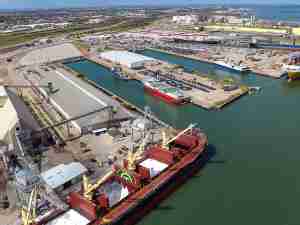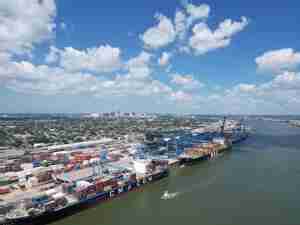Malaysia’s F1-inspired Westports surges forward in market debut
By: Reuters | Oct 18 2013 at 03:23 PM | Ports & Terminals
Calling itself a pit stop, the port operator backed by Asia's richest man, Li Ka-shing, derives 70 percent of its revenues from transhipments where super-sized ships move containers carrying finished goods to smaller vessels for transport to nearby markets.
Its aim is to shift 35 containers an hour instead of the industry-standard 25, a feat it compares to F1 pit crews turning around a race car in seconds and one that it hopes will help it weather a shipping industry downturn and fierce competition from other ports in the region.
Westports debuted on the Kuala Lumpur stock exchange with a market value of $2.9 billion. It is the largest listed port operator along the Malacca Straits that link Europe and the Middle East to Asia and carry 40 percent of global shipping trade.
"In terms of efficiency and productivity, Westports is just top notch," said Bharat Shah Joshi, an investment manager with Aberdeen Asset Management that oversees $5 billion worth of equities in Malaysia.
"The strong debut is driven by investors who want a slice of the action along the Malacca Straits where we will see a lot of expansion in the next three to five years."
The $680 million raised from selling 23.8 percent of the company will be distributed to existing shareholders - from billionaire Li to port workers - rather than used to fund expansion or repay debt. Westports said the stock market listing was more about branding and returning cash to shareholders than raising capital.
Big Challenges Ahead
The shipping industry is in its fifth year of a downturn, despite recent signs of a rise in bookings from China, as overcapacity weighs and big container firms scramble to form vessel-sharing alliances to cut costs.
"The dust needs to settle among the shippers. We call it a shipping downturn but there is container volume growth," said Westports Chief Executive Officer Ruben Gnanalingam, whose family owns a 46.8 percent stake in the company.
"Ships can come and go but the port business always survives so long as economies thrive," he said in an interview with Reuters on Thursday.
The world's three biggest shipping firms - Maersk Line, MSC Mediterranean Shipping Company S.A., and CMA CGM - announced plans in June to share 255 ships and cut costs.
Once European Union anti-competition officials give the green light, expected by next year, the trio will have to choose which hubs across the world will be their main ports of call.
Their focus is the Asia-Europe line, which has been lacklustre due to the uneven pace of the global economic recovery and where overcapacity has driven spot freight rates to loss-making levels.
On the Malacca Straits, Westports may lose out to the other ports as no shipper has invested in it, even though CMA accounts for 10 percent of revenues, bankers and industry analysts said.
Maersk, on the other hand, has a 30 percent stake in Syed Mokhtar's Port of Tanjung Pelepas (PTP) on the southern tip of Malaysia and MSC jointly controls a terminal further down in Singapore with the island-state's sole port operator.
"People forget these three shippers are not about to channel all the vessels in the alliance into one hub on the straits if the green light is given from the EU," Gnanalingam said. "There is the question of capacity constraints, which every port along the stretch is trying to deal with."
The Li Connection
To attract big-name customers, Westports, operating from central Malaysia's Port Klang, speeds it up with cranes that operate 1.4 times faster than the industry standard, which means ships can get in and out faster. Last year, it kept vessels waiting just two to three hours for berths compared with an average of four hours seen in other ports along the straits.
The connection with Li, who owns more than a fifth of Westports through a unit of Hutchison Whampoa Ltd, is a competitive advantage, Gnanalingam said.
"Li opens doors. His companies are involved in 50 over ports and they organize these meetings that give you access to the latest out there from engineering, IT and the business," he said. "You share, learn and compete with one another."
Last year, Westports handled 69 percent of the 10 million twenty equivalent unit (TEU) containers passing through Port Klang - the 12th busiest port in the world.
Building Up Volumes
Westports will expand capacity by 68 percent to 16 million TEUs, in part to comply with requirements from the Malaysian government before it extends the company's concession by 30 years to 2054. Gnanalingam said Westports will tap debt markets to fund growth.
Westports faces keen competition in the battle to ramp up capacity from politically connected Syed Mokhtar, whose infrastructure group MMC Corp controls PTP and Johor Port in southern Malaysia.
PTP has spent $450 million to lift its annual handling capacity by 25 percent to 10.5 million TEUs by next year.
"Competition is not a scary prospect in the Malacca Straits. Everyone grows," said Gnanalingam. "When we first started out in 1990s, 15 million TEUs a year came through the straits. Now its 50 million this year. You can't get that anywhere else." (Reuters)










